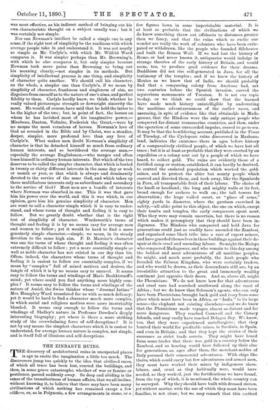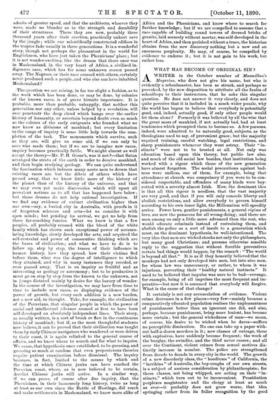THE ZINBA.BYE RUINS.
THE discovery of architectural ruins in unexpected places
is apt to excite the imagination a little too much. The discoverers jump too quickly to the idea that civilised races, of which all trace has been lost, erected the buildings, and then, in some grave catastrophe, whether of war or famine or pestilence, passed suddenly away. So deep and abiding is the sense of the transitoriness of human affairs, that we all incline, without knowing it, to believe that there may have been many civilisations of which nothing has remained except a few edifices, or, as in Polynesia, a few arrangements in stone, or a few figures hewn in some imperishable material. It is at least as probable that the civilisations of which we do know something threw out offshoots to distances greater than we fancy, and that the ruins which so excite our wonder are really the work of colonists who have been extir- pated or withdrawn, like the people who founded Silchester and built the Roman Wall. If we had lost the history of Rome, or had never known it, antiquaries would indulge in strange theories of the early history of Britain, and would seem, too, to produce good evidence for their. dreams. Buddhism did not rise self-generated in Java, for all the testimony of the temples ; and if we knew the history of Mexico as we know that of India, we should probably find that a conquering colony from Anahuac had, not two centuries before the Spanish invasion, carved the mysterious monuments of Yucatan. It is not our topic to-day, or we think we could show that the learned have made much history unintelligible by underrating the maritime adventurousness of the earlier races, and assuming, in spite of evidence like that obtainable in Mada- gascar, that the Hindoos were the only antique people who conquered far-distant transmarine countries, and then, under the operation of some unrecorded impulse, ceased to go to sea. It may be that the bewildering account, published in the Times of Tuesday, of the Cyclopean ruins discovered in Mashona- land, indicates the existence- there in ages before history of a comparatively civilised people, of which we have lost all trace ; but it is at least as probable that they were erected by an expedition or a colony sent out by a people of which we have heard, to collect gold. The ruins are evidently those of a fortified damp or station, established, it can hardly be doubted, to control the enslaved population which worked the gold- mines, and to protect the abler but scanty people which coerced and directed them, and took away, like the Spaniards in Peru, all transportable fruit of their labour. The choice of the knoll or headland ; the long and mighty walls at its feet, broad enough for archers to walk on ; the tall towers for observation ; the huge walled court, or "place of arms," eighty yards in diameter, where the garrison exercised in safety,—all alike point to this object, the one on which, except their tombs and temples, the early conquerors spent most. Who they were may remain uncertain, but there is no reason which makes it peremptory that they should have been in- digenous. The Hindoos who conquered and held Java for generations could just as readily have ascended the Zambesi, and organised some black tribe into a race of expert miners, and have guarded themselves in these buildings against their de- spair at their cruel and unending labour. So might the Malays who conquered Madagascar, and who remain to this day among
• the boldest and most adventurous of all maritime peoples. So might, and much more probably, the Arab people who founded the Sabtean Kingdom, who were certainly traders, and who would be drawn, as their descendants still are, by an irresistible attraction to the great and immensely wealthy continent just opposite their doors. And so, above all, might the Phcenicians. We do not know how far that adventurous and cruel race had searched southward along the coast of Africa ; but we do know that Solomon's agents, who can only have been Phcenicians, brought back gold and ivory from some place which must have been in Africa, or " India " in its large sense—the elephant not existing elsewhere—and we do know that the Phasnicians made voyages almost as distant and far more dangerous. They reached Cornwall and the Canary Islands, and may easily have reached Delagoa Bay. We know, too, that they were experienced metallurgists ; that they hunted their world for profitable mines, in Sardinia, in Spain, and even in Britain; and that they kept the stories of their successes as strict trade secrets. They might have heard from some trader that there was gold in a country below the Zambesi, and so hearing would have followed up their clue for generations, as, ages after them, the merchant-nobles of Italy pursued their commercial adventures. With ships like theirs, which could carry but few adventurers and armed men, they must have worked their mines by indigenous slave- labour, and, cruel as they habitually were, would have needed, as they worked, just the fortifications we have found, from the top of which, it is mentioned, the whole country can be surveyed. Why they should have built with dressed stones, yet without mortar, with the use of which they must have been familiar, is not clear; but we may remark that this method admits of greater speed, and that the architects, whoever they were, made no blunder as to the strength and durability of their structures. There they are now, probably three thousand years after their erection, practically unhurt save by the jungle ; while our scientifically constructed edifices in the tropics fade usually in three generations. It is a wonderful story, though not perhaps the pleasantest in the world for Englishmen, who have just taken the Phoenicians' place ; but it is not wonder-exciting, like the dream that there once was in Maahonaland, in the very heart of Africa, a civilised in- digenous race, which has for some unknown reason passed away. The Negroes, or their race crossed with others, certainly never produced such a people, and who else can have inhabited Mashonaland ?
The question we are raising, in far too slight a fashion, as to the work which has been done, or may be done, by colonies of the known races, is of grave historic importance. It is probable, more than probable, unhappily, that neither this generation nor any other, unless helped by a revelation, will ever penetrate the deep cloud which hangs over the earlier history of humanity, or ascertain beyond doubt even so much as the colours of the early emigrants who founded what we now know as divisions of mankind ; but every limitation to the range of inquiry is some little help towards the com- pletion of the task. The monuments which survive, such as they are, will give us some aid, if we can only be sure who made them ; but if we are to imagine new races, inquiry becomes practically futile. We might almost as well accspt the theory—Mr. P. H Gosse's, was it not P—that Satan arranged the strata of the earth in order to deceive mankind, and then begin studying geology. We can quite understand the fascination which induces many acute men to dream that existing races are but the cleibris of others which have passed away, that we know little more of the history of the planet than of the history of the universe, and that we may even yet make discoveries which will upset all prevalent notions as to all that has happened here below ; but those dreams do not help rational investigation. If we find any evidence of extinct civilisation higher than our own—say, a buried city in Australia, with proofs in it of forgotten sciences and arts—let us consider it with open minds ; but pending its arrival, we get no help from these far-reaching fancies. What we know is that a few peoples, all probably crossed with the blood of the white family which has shown such exceptional power of accumu- lating knowledge, slowly developed the arts, and acquired the self-restraint and power of consecutive thinking which are the bases of civilisation ; and what we have to do is to follow up, step by step, the traces of their influence in human history, how they spread, how their victims fled before them, what was the degree of intelligence to which they attained, and why in many instances they receded, or even passed away. That is an inquiry as fruitful and as interesting as geology or astronomy ; but to be productive it must go on step by step from the known to the unknown, not in jumps dictated mainly by desire for the luxury of wonder. In the course of the investigation, we may have from time to time to include new races, as displaying evidence of the power of growth, but every such addition is a new burden, not a new aid, to thought. Take, for example, the civilisation of the Peruvians, that singular people in which the power of social and intellectual advance seemed at first to have been self-developed on absolutely independent lines. Their story, as usually written, is a sort of break or flaw in the continuous history of mankind ; but if, as the most thoughtful students now believe, it can be proved that their civilisation was taught them by early Chinese navigators who wandered or were driven to their coast, it is again relinked to the general course of affairs, and we know where to search and for what to inquire. We cease, that hypothesis once established, to be guessing, and guessing so much at random that even preposterous theories require patient examination before dismissal. The inquiry becomes, in fact, limited to the means by which and the time at which Chinese junks can have reached the Peruvian coast, where, as is now believed to be certain, derelict Chinese junks still arrive. In a similar way, if we can prove, of course after due inquiry, that the Phoenicians, in their immensely long history, twice as long at least as our own since the Battle of Hastings, did reach and make settlements in Mashonaland, we know more alike of Africa and the Phoenicians, and know where to search for further knowledge ; but if we are compelled to assume that a race capable of building round towers of dressed bricks of granite, laid securely without mortar, was self-developed in the heart of Africa, and then perished without a trace, the historian obtains from the new discovery nothing but a new and an enormous perplexity. He may, of course, be compelled by evidence to endorse it ; but it is not gain to his work, but rather loss.



















































 Previous page
Previous page